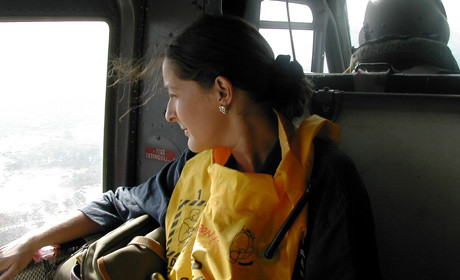
Journalist Frances Harrison, a former BBC correspondent, is one of more than 30 contributors to the book
More than 30 women journalists have contributed to a new book called 'No Woman's Land: On the Frontlines with Female Reporters', which will see its proceeds go towards safety training for female reporters.
The publication will be officially launched later today by the International News Safety Institute (INSI) in a bid to offer "an unprecedented insight into the safety of women journalists working in conflict and danger zones".
Contributors include CBS chief foreign affairs correspondent Lara Logan, whose assault while reporting from Egypt last year prompted the idea for the book.
Logan penned the publication's foreword, in which she says: "I remember begging for my life. I remember giving up."
"It is important that we as women doing dangerous work in hostile places are equipped with knowledge and foresight. Knowing how important it is to
stay on your feet in a mob, meant that every time my legs stumbled or gave way or were dragged down, I fought my way back up, saying over and over in my mind, 'you have to stay on your feet or you will die'.
"Somehow, somewhere, like a light in the back of your brain, your training and experience kick in, even in the midst of that chaos.
"But what cannot be taught or trained, is the knowledge of who you are. That is the light that will guide you to recovery in the dark months or years that follow. That is the light that showed me so clearly how important it was to speak out and not to hide."
The book aims to offer both insight into the experiences of the many women journalists reporting from across the world, some anonymously, as well as advice for others who may find themselves in similar situations.
Frances Harrison, one of the book's authors who has been a BBC correspondent in Bangladesh, Malaysia, Sri Lanka and Iran, spoke about the issue of being a mother and foreign correspondent simultaneously in a feature for Journalism.co.uk ahead of the book launch.
Below are some other brief extracts from the accounts shared by women in the new publication:
Jennifer Griffin, Middle East correspondent, Fox News Channel
"The decisions that we as female journalists covering wars make on a day-to-day basis are different than those of our male colleagues. These days I mostly travel with Pentagon officials on VIP trips so the journey is not that dangerous. From prior days and prior wars, the most important safety tip in my experience is to dress appropriately. No low cut blouses or sleeveless shirts. And literally cover your ass. Longer blousy shirts or tunics are better than anything skin tight. Most of the convulsed countries are conservative, if not Muslim, and dress code matters. You don’t want to invite unwanted attention."
Judith Matloff, North America director, International News Safety Institute
"Indeed, instead of pulling women back from the field, managers should ensure they receive proper training in order to make sound judgments. Employers should ensure rape prevention is introduced into safety training. Women must learn how to set verbal boundaries so that predators keep a distance.
"Women should hang alarms on their doorknobs so that predators can't break in. And supervisors should have frank conversations so that female staff feel comfortable confiding should the unmentionable occur."
Bay Fang, incoming deputy assistant secretary of state for press and public diplomacy for Europe, US State Department
"Male or a female, you have to use your own judgement as to whether it is more beneficial to be low profile, or to have additional security which might make you stand out. Being a woman, especially in places like Iraq and Afghanistan, makes it easier to be low profile."
Free daily newsletter
If you like our news and feature articles, you can sign up to receive our free daily (Mon-Fri) email newsletter (mobile friendly).
Related articles
- Newsrooms must step up their efforts to cover gender equality stories
- Annette Young, TV news presenter, France 24, on running a news show about gender inequality
- Meet the inspiring, disabled journalists working their dream jobs
- Shaping the future of journalism: insights for the next generation
- New free course on war reporting launched









